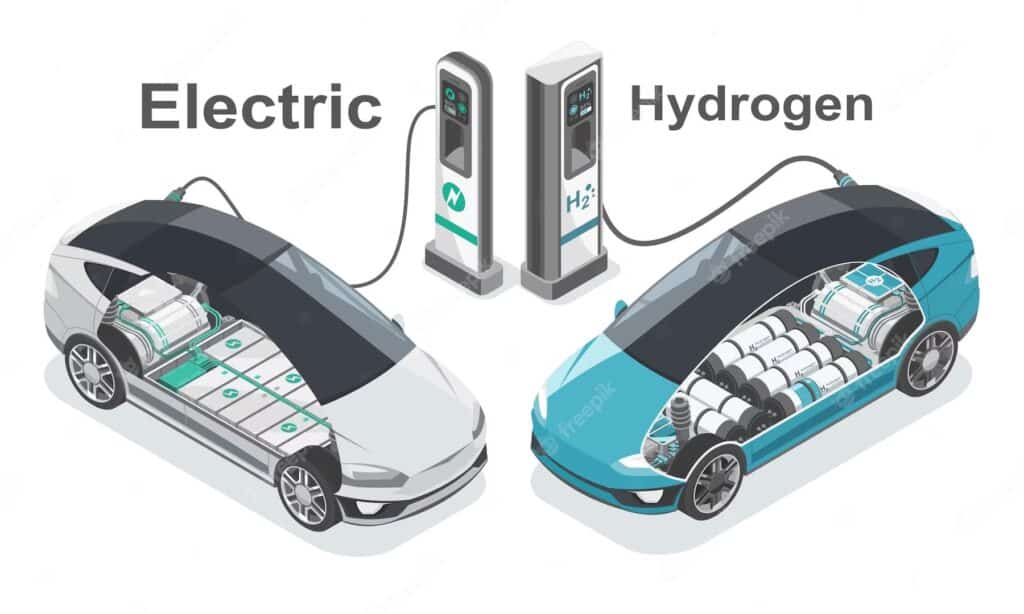
Introduction
In the battle against climate change, the transportation sector plays a pivotal role. Two promising alternatives to internal combustion engines exist: hydrogen fuel cell vehicles (FCVs) and electric vehicles (EVs). Each of these technologies has advantages and drawbacks, making it a topic of much debate in the automotive world. In this article, we’ll delve into the key differences between hydrogen cars and electric cars, looking at aspects such as performance, efficiency, and environmental impact.
Performance
-
Hydrogen Cars
Hydrogen FCVs offer a driving experience similar to traditional gasoline-powered vehicles. They have a faster refueling time—usually around 3 to 5 minutes—and a longer driving range. This makes them suitable for long journeys where quick refueling is essential.
-
Electric Cars
Electric vehicles, on the other hand, require longer charging times. Fast chargers can do the job in about 30 minutes, but standard home charging can take several hours. However, EVs benefit from smoother acceleration and quieter operation.
Efficiency and Emissions
- Hydrogen Cars
Hydrogen is an abundant element that can be sourced sustainably. However, the process of extracting it can be energy-intensive and may involve the use of fossil fuels. Hydrogen fuel cells are generally less efficient than electric batteries, owing to energy losses that occur during the hydrogen production, transportation, and conversion processes.
- Electric Cars
EVs are generally more energy-efficient, drawing their power from various renewable sources such as solar or wind energy. The absence of tailpipe emissions is another crucial advantage, although the environmental impact depends on the source of the electricity used for charging.
Infrastructure
- Hydrogen Cars
Hydrogen infrastructure is still in its nascent stage. The production, storage, and distribution of hydrogen fuel require an entirely new framework, which involves significant investment and time.
- Electric Cars
Electric vehicles benefit from a more mature infrastructure. With the ubiquity of electrical outlets and the increasing number of dedicated charging stations, EVs are currently more convenient for urban commuting.
Environmental Impact
- Hydrogen Cars
Hydrogen can be a clean fuel source when produced using sustainable methods, with water being the only byproduct during usage. However, if sourced from fossil fuels, the environmental benefits diminish significantly.
- Electric Cars
Electric vehicles are only as green as the electricity that charges them. If charged from renewable sources, they offer a highly sustainable method of transport with zero tailpipe emissions.
Cost
- Hydrogen Cars
The cost of hydrogen cars is relatively high due to the expensive fuel cells and the need for widespread adoption. However, these costs are expected to decrease as technology advances and scales.
- Electric Cars
While the initial purchase price of an electric vehicle may be high, lower operating costs and increasing battery life are making EVs an increasingly cost-effective option.
Conclusion Hydrogen cars and Electric cars
Both hydrogen and electric cars have a role to play in the future of sustainable transportation. Hydrogen cars offer quick refueling and longer-range benefits, making them ideal for specific use cases like long-haul travel and heavy-duty vehicles. Electric cars, however, have the advantage of higher efficiency, more mature infrastructure, and a broader range of vehicle types. As both technologies evolve, we’ll see a hybrid approach where hydrogen and electric systems coexist, leveraging their strengths to create a greener, more sustainable future.
Understanding the nuances between hydrogen and electric vehicles will help consumers make informed decisions, aligning their choices with their specific needs and advancing sustainable practices.
So, the next time you’re contemplating a switch to a green vehicle, consider the factors discussed in this article to make a choice that suits both your lifestyle and the planet.
Electric Cars and the Global Auto Industry: An In-depth Analysis of Production Chain Impacts
Introduction
As the world transitions toward sustainable energy, electric vehicles (EVs) are increasingly gaining traction as the go-to alternative to traditional gasoline-powered cars. However, this seismic shift has raised concerns about its ripple effect on the global automobile production chain, particularly in countries like the USA, Germany, and Italy, renowned for their mechanical engineering prowess. Is the rise of electric cars a win for the planet but a loss for these countries’ automotive industries? Could this shift disproportionately benefit China, a leader in electric car batteries? Let’s delve into this intricate issue.
Impact on Mechanical Companies
The USA, Germany, and Italy
These nations are powerhouses in the automotive sector, known for their cutting-edge mechanical technologies and innovations. A complete shift to electric vehicles, requiring fewer mechanical components, could disrupt the industry. Manufacturing jobs focused on the internal combustion engine (ICE) might become obsolete, as EVs need fewer moving parts.
China
China has a strong foothold in the electric car battery market and could gain from a global shift to electric vehicles. Their expertise in lithium-ion technology has put them at the forefront of the EV revolution, and they show no signs of slowing down.
Realigning Skills and Innovation
Skill Transfer
The rise of EVs doesn’t necessarily spell doom for mechanical companies. The expertise in materials science, aerodynamics, and power management can be repurposed to improve electric vehicle technologies. The transition could create opportunities for new forms of collaboration.
Innovation
Countries like Germany, Italy, and the USA have a rich history of innovation. A proactive approach to EV technology could mean the development of more efficient batteries, lightweight materials, and smarter energy management systems, enabling these countries to carve out their niche in the EV marketplace.
Market Dynamics and Geopolitics
Dominance in Battery Manufacturing
China’s advantage in battery technology is undeniable, but it’s not an insurmountable lead. R&D investments could enable other countries to catch up or even pioneer next-gen technologies like solid-state batteries.
Geopolitical Tensions
Trade relations also play a role in this complex equation. With increasing geopolitical tensions, relying on one country for a critical part of the EV supply chain could be risky.
Sustainability vs. Economy: The Balancing Act
The shift to electric vehicles is, at its core, a sustainability move. While economic factors are crucial, they must be balanced against the planet’s long-term health. This situation calls for a nuanced approach that doesn’t sacrifice one for the other.
Conclusion
The rise of electric vehicles undoubtedly poses challenges for the traditional automotive sectors in the USA, Germany, and Italy. However, rather than viewing this as a zero-sum game where one country’s gain is another’s loss, it’s more productive to view it as an industry evolution.
Countries with strong mechanical engineering capabilities have the opportunity to pivot, adapt, and contribute to the burgeoning EV market. By focusing on innovation and strategic partnerships, these nations can find their place in the new automotive world without necessarily ceding ground to China or any other country currently leading in specific technologies.
So, as we advance toward a more sustainable future, it’s essential for all stakeholders—governments, industries, and consumers—to consider the broader picture. Only by doing so can we drive forward in a way that’s both economically and environmentally sustainable.
Looking toward the future of sustainable transportation, it’s evident that hydrogen and electric cars each have their respective roles to play. Hydrogen cars offer quick refueling and longer-range benefits, making them ideal for specific use cases like long-haul travel and heavy-duty vehicles. On the other hand, electric cars have the advantage of higher efficiency, more mature infrastructure, and a broader range of vehicle types. As these two technologies continue to evolve, a hybrid approach will emerge, where hydrogen and electric systems coexist and leverage their unique strengths to create a greener, more sustainable future. This approach will require careful planning and execution, and that’s where Convergence Consulting can assist.
Working with Convergence Consulting is an essential step towards a more sustainable future. Whether you’re a business owner looking to reduce your carbon footprint or an individual seeking to make a positive impact on the planet, they’re here to help. Contact us today to learn more.

Leave a Reply